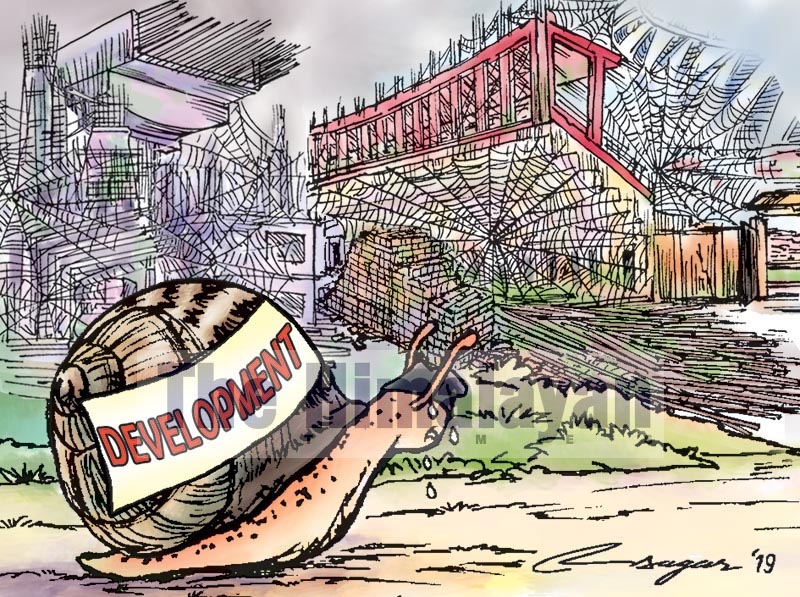Construction delay: Poor planning to blame
It’s time for engineers, planners and experts in construction management to lead bodies like the National Planning Commission and infrastructure development institutions for the timely completion of projects
The development of a nation depends upon the progress of construction projects. Data show that the Nepal construction industry contributes 10-11 per cent to the GDP and uses about 35 per cent of the budget. It employs about a million people, making it second only to the agriculture sector in the country. Similarly, about 60 per cent of the nation’s budget is spent through the contractors.
Delays are one of the major problems in the construction industry across the globe, and Nepal is no exception. The Melamchi Drinking Water Supply Project, for instance, was started in December 2000 with the aim of completing it in 2007, but it is still incomplete. The World Bank (WB) withdrew its investment from the project in 2005 due to delays.
In a report published by the Commission for the Investigation of Abuse of Authority, in 2075 BS, there were 906 delayed construction projects under the Department of Roads, Ministry of Physical Infrastructure and Transport. The total contract amount was worth Rs 20.76 billion. Similar is the case with other ministries and departments of Nepal concerned with infrastructure development. The report shows that altogether 1,848 construction projects worth Rs 118 billion have not been completed on time. There are provisions related to project termination and extension of time in the contract acts and regulations, but the report shows that 1,032 projects have neither been terminated nor their duration extended. So legally these projects do not exist.
Projects delay occurs due to a number of reasons. Studies show that there are several contactors, client and employer-related factors as well as external factors that cause delay in construction.
Factors such as delay in payments to the contractor and frequent change orders during construction, inability to provide the site to the contractor, delay in revising and approving design documents, poor communication and coordination, slowness in the decision-making process, conflict when there is joint-ownership of the project and suspension of work extend the construction period.
The various contractor-related factors are difficulties in financing projects by the contractor, poor qualification of the contractor’s technical staff, ineffective planning and scheduling of project, poor communication and co-ordination, lack of contractual knowledge, conflict in sub-contractors’ schedule in execution of project, conflict between contractor and other parties (consultant and owner), delay in site mobilisation, poor site management and supervision, improper construction methods, shortage of manpower, shortage of construction materials, poor quality material, escalation of material prices and late delivery of materials, and lack of high technology mechanical equipment.
Consultant-related delays include delay in approving major changes in the scope of work, poor communication and coordination, inadequate experience or mistakes and discrepancies in design documents, unclear and inadequate details in drawings, and insufficient data collection and survey before design.
Similarly, external factors are problems of land acquisition, environmental issues related to tree cutting, price escalation, inclement weather, civil disturbances, labour disputes, government regulations, slow permit by government, unforeseen ground conditions, such as poor soil and high water table, and delay in providing services from utilities like water and electricity.
Construction delay invites dispute even in project termination. It also lengthens the schedule, increases the project cost and hinders economic growth. Arbitration and litigation procedures may arise, which are lengthy and may even take several years to get a court decision.
Contractors are often called ‘thekdars’ in Nepali, but they should not be treated as such. They should be treated as nation builders. All the parties should be aware of the latest construction methods, technology and modern construction equipment. Experts in construction management should be involved in project planning and scheduling, site management and supervision work. In many cases, there have been problems during land acquisition, chopping trees and the like. These problems should be solved through mutual co-ordination with the public and rapid improvement in the Environment, Land Acquisition and Procurement Acts of Nepal.
Litigation measures and government guidelines alone will not work unless they are implemented effectively. Only blacklisting the contractors will also not speed up construction projects. Past experience of projects like the Melamchi has raised several questions. We need to make a plan realistic and implementable.
Benjamin Franklin once said, ‘If you fail to plan, you plan to fail’. Today’s need is not to blame one other. We have many more projects, including 23 national pride projects. It’s time to learn lessons from the past and not repeat the mistakes. It’s time for engineers, planners and experts in construction management to lead bodies like the National Planning Commission, construction companies and other infrastructure development institutions for the timely and successful completion of projects.
Neupane is with Central Campus of Engineering, Mid-Western University






